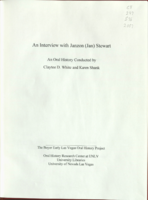Search the Special Collections and Archives Portal
Search Results

Luella Knuckles interview, February 28, 1980: transcript
Date
Archival Collection
Description
On February 28, 1980, Paul Gentle interviewed Luella Knuckles (b. 1910 in Impolla, Texas) about life as an African-American in Las Vegas, Nevada. Knuckles talks to Gentle about the conditions that African-Americans lived in and the discrimination they faced when first arriving to the city. Knuckles, in particular, spends a portion of the interview discussing the segregated layout of Las Vegas and the jobs and opportunities that were available for the black community in a segregated town. Moreover, she provides anecdotes about her deceased husband’s employment, their experience buying and repairing a property by themselves, and the changes in attitudes as the city desegregated. The conversation later focuses on the Church’s place in the African-American community, education and participation in church activities, and Knuckle’s personal love for books and Bible study.
Text

Transcript of interview with Marshall Mack Dawson by Robert Maichle, November 1, 1979
Date
Archival Collection
Description
On November 1, 1979, Robert Maichle interviewed Marshall Mack Dawson (born 1938 in Las Vegas, Nevada) about his experiences living in Las Vegas. Dawson first talks about his early education, his family, and the Old Las Vegas Mormon Fort. He then describes the changes he has noticed over time, the atomic testing, the Helldorado parades, Red Rock, the development of the Strip, and the changes in the Downtown area. Dawson also discusses some of his work for Nevada Power, the early movie theaters, his opinions on journalism, and various other topics.
Text

Transcript of interview with Mary Cooke by Gigi Arino, March 18, 1978
Date
Archival Collection
Description
On March 18, 1978, Gigi Arino interviewed antique shop owner, Mary B. Cooke (born November 13th, 1936 in Watertown, Wisconsin) in her antique shop in Las Vegas, Nevada. During this interview Mary discusses previous jobs, personal family history, education, and the growth and development of the city. She also expresses her opinions on the topic of welfare, healthcare and the condition of the hospitals in Las Vegas.
Text

Transcript of interview with Jack Cornell by Richard Fesler, February 18, 1979
Date
Archival Collection
Description
On February 18, 1979, Richard Fesler interviewed Jack W. Cornell (born 1918 in Manhattan, Nevada) about his experiences living in Nevada. The two first discuss historical buildings, including the Nye County Courthouse, and Cornell describes his family background and the different locations at which his ancestors lived. Cornell then talks about his experiences as an airplane mechanic for the Army Air Corps during World War II and the different countries he would visit during that time. The two also discuss the effects of the Depression, Cornell’s work in automotive body repair, and his recreational activities. Cornell also describes an experience in which he assisted an air escort for President Roosevelt, and he also describes when he witnessed one of the atomic tests. The interview concludes with Cornell’s thoughts on how the rural area in Manhattan has changed over time.
Text

Transcript of interview with Alice Doolittle by Christopher Moran, March 21, 1977
Date
Archival Collection
Description
On March 21, 1977, Christopher Moran interviewed Alice Doolittle (born 1897 in Boston, Massachusetts) about her experiences while living in Nevada. Also present during the interview is Ruth Belding, Alice’s daughter. Doolittle first talks about her reasons for coming to Las Vegas and her eventual occupation as a dental assistant. She also talks about her family’s history of living on the Stewart Ranch and the ranch’s swimming pool that attracted many during the summers of Las Vegas. Doolittle also describes her move to Boulder City with her husband, the first theaters in Las Vegas, and the Union Pacific Railroad. At the end of the interview, the three discuss Helen Stewart, Harley Harmon, and the Doolittle Center, named after Doolittle’s late husband, Ferris Doolittle.
Text

Transcript of interview with Sam Earl by Laura Button, March 9, 1981
Date
Archival Collection
Description
On March 9, 1981, Laura Button interviewed Sam Earl (born 1912 in Virgin, Utah) about his life in Nevada. Also present during the interview is Sam’s wife, Melissa Earl. The three discuss a wide range of topics from the early development of Las Vegas, Sam’s work on the Boulder Dam, the Earls’ early residence in a tent, and the family’s religious participation. The interview also covers gambling, Block 16, the first members of the police force, recreational activities, and the Helldorado parade. Sam also talks about his work as a building contractor, including some of the buildings and casino properties he helped build, and the interview moves to a discussion of the development of the Las Vegas Strip. The interview concludes with Sam’s description of his work as a truck driver and a discussion on welfare benefits.
Text

Nicole Charlton oral history interview: transcript
Date
Archival Collection
Description
Oral history interview with Nicole Charlton conducted by Barbara Tabach on May 23, 2018 for the Remembering 1 October Oral History Project. In this interview, Charlton discusses her early life in Carlin, Nevada and relocating to Las Vegas, Nevada in 1990. Charlton is the Executive Secretary to the Clark County Coroner John Fudenberg and was among the first from the Coroner's office on the scene of the Route 91 shooting in Las Vegas.
Text

Charissa B. Fabian oral history interview: transcript
Date
Archival Collection
Description
Oral history interview with Charissa B. Fabian conducted by Kyle Gregory Baluyut on November 24, 2021 for Reflections: The Las Vegas Asian American and Pacific Islander Oral History Project. In this interview, Charissa B. Fabian discusses her upbringing in Angeles City, Pampanga, Philippines with her three siblings and memories shared with her grandparents and cousins. She talks about her nursing education from the University of the Philippines and her immigration via a recruitment agency to work in New York. Charissa Fabian reflects on her move to Las Vegas, Nevada with her husband in 1995, the growing Filipino population in the city, and her work as a nurse. She also shares her thoughts on the immigration process, the COVID-19 pandemic, and politics.
Text

Transcript of interview with Jan Stewart by Claytee White, June 28, 2010
Date
Archival Collection
Description
In 1901, Jan Stewart's grandfather William T. Stewart brought his family to Alamo, Nevada in Lincoln County and about 90 miles north of Las Vegas to ranch. Soon he and his wife were operating a livery stable. One of his customers was an executive with the Union Pacific Railroad for whom he provided transportation to Las Vegas, where the railroad owned a ranch referred to as the Old Ranch. In this narrative Jan recounts how his grandfather and later his father became managers of the Old Ranch and lived a just a few dozen yards from the Old Mormon Fort, a historic Las Vegas landmark. In addition to sharing stories of his family's history, he describes how the ranch was a unique place to group up, brought the family in contact with many community people and an occasional celebrity.
Text

Transcript of interview with Jan Kennedy by Barbara Tabach, September 7, 2011
Date
Archival Collection
Description
Jan Kennedy was born (1924) Janet Parmelee, the daughter of a Connecticut physician and a homemaker. In high school she met Norman Kennedy, who she would marry after both had attended college and to whom she was married for 64 years. Until 1963, their roots seemed to be taking hold in the Seattle area. That is until Norm was offered an attractive career opportunity as a weather man at the Nevada Test Site. They settled in and enjoyed a zest-filled life with their four sons and a dynamic group of friends who they often entertained at their cabin in Mount Charleston. In addition, Jan managed to volunteer for a list of organizations including UMC Hospital/Southern Nevada Memorial Hospital; Clark County Museum Guild; Salvation Army Women's Auxiliary; church deacon; Assistance League; Red Hats—keeping herself ever busy and joyfully satisfied.
Text
